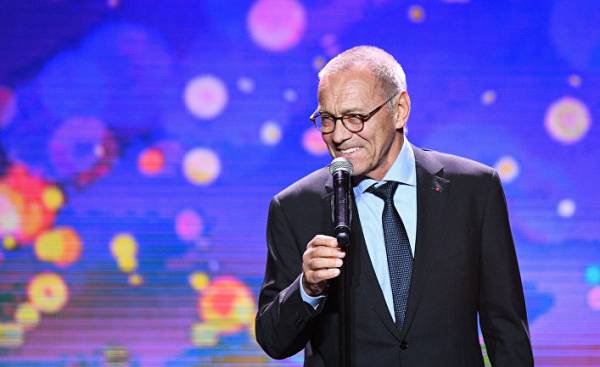
Der Spiegel: Mr. Director, in your movie “Ray” SS officer Helmut at some point puts on a gramophone record Brahms. What is that supposed to show?
Andrei Konchalovsky: it was important for Me to Express in this film their own doubts. Brahms — one of the greatest geniuses in the history of German culture. The fact that the German SS officer loves Brahms, proves his high cultural level. You love people not because they are good. You love them, even if they do terrible things. It is a mystery. I deliberately portrayed the German so. I didn’t want in any way to assess SS officer Helmut. As SS officer, he was supposed to hate Jews. I wanted his hatred of Jews was intolerable. But I didn’t want the audience hated him. For me it was more important to keep this ambiguity. I love Helmut. Because I love German culture.
Another “fixed star” culture — Chekhov, his books appear in the film “Ray” as the trophies — again Helmut, a German officer.
When I worked on the script, hurt me three facts. First, real story of Russian aristocrat and member of the Resistance movement Wiki Obolensky, second, novel by Jonathan Littel (Jonathan Littell), it tells the story of one SS officer, and finally, the fact that the bride Chekhov (Dunya Efros, died in 1943 at the age of 83 years — approx. ed.) was killed in a concentration camp. These three elements seemed to me so strong that I wanted to do a study of characters and events. I want the viewer confused. He couldn’t just say, “Yes, it’s understandable.” No, it is much more difficult. Though, because Paradise is unthinkable without Ada.
— Hell is a concentration camp. You made a choice in favor of a clear, documentary style that is somewhat reminiscent of, interview, interrogation or confession. Why this rigidity?
— Because it is logical. To portray the concentration camp in color would be wrong — it would be something like Opera. That’s why I showed only fragments of the camp. That depicted me, it is the bureaucracy of hell. And it’s just awful. Hell can be chaotic, but also well-organized, like Orwell. Evil cannot be easy to recognize. And besides, evil can be seductive. Now we are gradually and unwittingly get on a new level of evil. We all depend on the buttons that we trust our memory. Because you sometimes can’t remember my own phone number! We need to fight for our memories, for our memories.
“Paradise” makes to Wake up memories: a defining moment become memories of “the other side of the grave.” While you fully concentrate on the words, on their faces.
— I want to remind people that no visual effects, no “Spider-Man” or “Iron man” can’t be more interesting than a human face. Of course, I would not be able to rent a movie in Hollywood. However, we are deeply immersed in the painting through the simple fact that one person tells another that he believes him and follows his words. Interesting to see the man’s face — are often far more interesting than a car chase involving two cars.
— You emigrated from the Soviet Union to the United States, and you happened to make a movie under two different systems — communism and capitalism. Your second film was banned in the Soviet Union. Living in the United States, did you feel more freedom?
— The fact that we often idealize or exaggerate the meaning of “freedom”. Freedom is the same illusion as an economic success. Both we take as synonyms the concepts of “happiness” — and this is a big mistake. Economic success does not make people happier. And then they start to wonder: is it possible to be completely free?
And?
— Answer: from what? Then you have to answer: from censorship. But then the question arises: if you’re free from censorship, what do you create? Masterpiece? Answer: no, you only free. If you look at art history, we can see that many masterpieces were created under the great pressure of censorship. And this is a great inner contradiction of freedom: it can not guarantee neither happiness nor of the fact that you get a masterpiece.
— But isn’t freedom does not make people happier?
— What makes you happy? It’s like a baby. Even if the child has all the toys in the world, it’s possible that he’s very unhappy. On the other hand, the child can play any piece of wood and be happy. Here comes into play my relativism. Freedom in itself does not make one happy. The artist also cannot be free, because in his mind lives a whole “Ministry of censorship”. After all, what is the basis of censorship? Ethics. What is ethics? Culture. But what is culture? Tradition. In this sense culture consists entirely of responsibilities. For example, a German will stop in front of the traffic light when the red light, although he wants to go further.
— That is, culture can not be free?
— For an artist the most important thing is to be able to Express themselves. To Express themselves so as not to depend on any instructions and regulations. But not to be completely free. In this sense, I don’t want to be free. Today I want in my films to understand whether we hear anything in the silence? Nothing close to God as silence. Words prove that the silence exists. If there were no words, then there would be silence.
— And what about silence, arising as a result of censorship?
— Censorship is exercised at the expense of money, much more than censorship on ideological grounds. I can’t say that we in Russia are not as free as artists. Andrei Tarkovsky could not withdraw his “Andrei Rublev” in Hollywood, because it was a real Amateur movie. My film “Asino happiness” was banned, Yes, but I made it. The difference is that the USSR could make a film, which is then prohibited.
And in Hollywood just would not appear the possibility. I think censorship is not a bad thing for the artist. Total freedom does not guarantee that it will appear many masterpieces. The value of art is to overcome the force of gravity. Gravity is censorship. It is inside you, that’s your ethics, your faith. If gravity no, it will not muscle. The muscles appear where there is resistance.
— You’ve traveled the world, lived in opposite parts of the globe. However, even films from Hollywood, is always rooted in Russian culture. Russia can be called the “center of gravity” of your creativity?
— Yes! I Russian culture is like an umbilical cord that cannot be cut. And I am a traveller who travel all over the world. I left the Soviet Union and returned to Russia. But what is homeland? Motherland — a place where you love. Where is your family. And where do you need. I always felt important in Russia. And I can freely talk about their ideas for the world if I — Russian.







